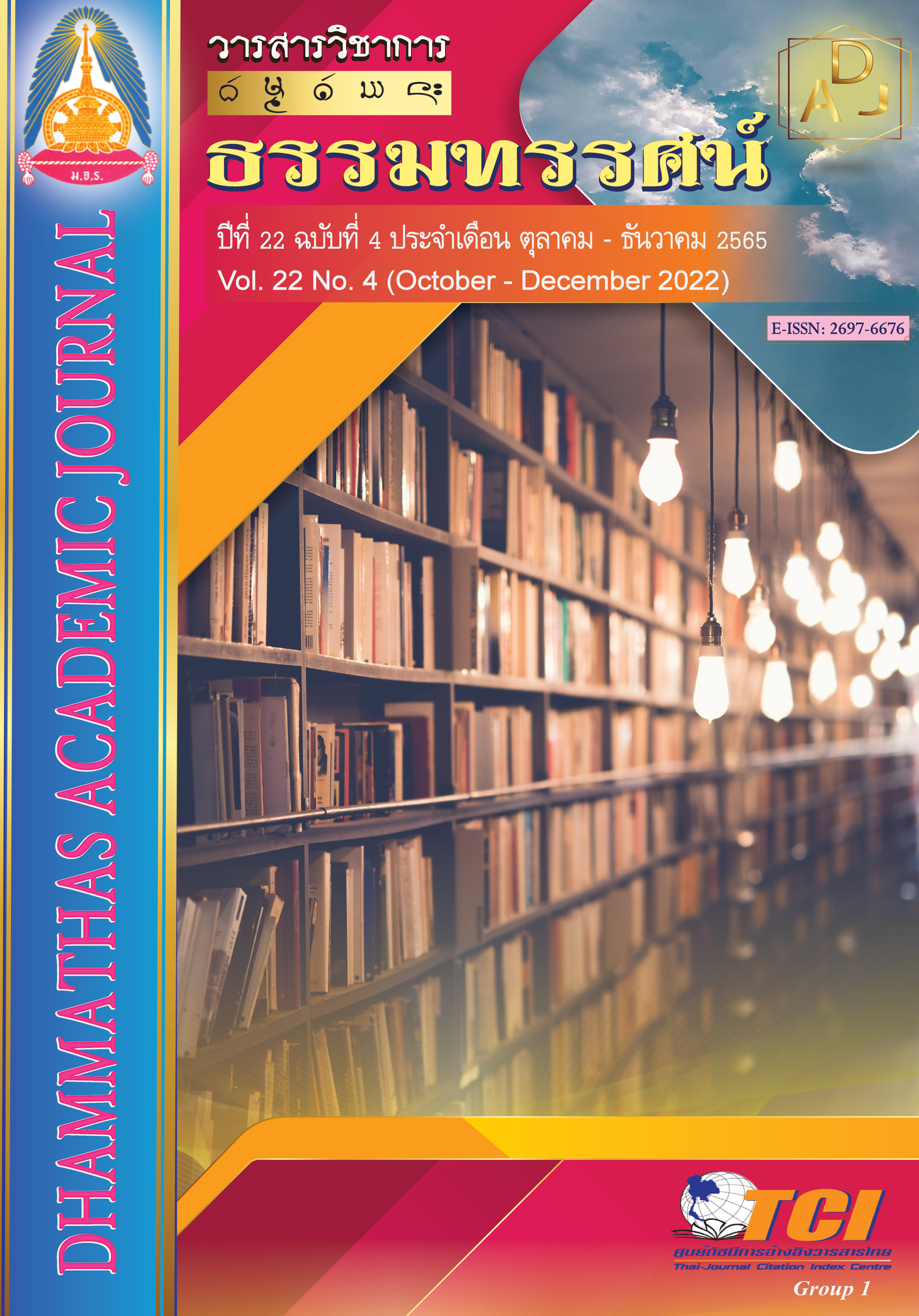The Set of Ideas of Health Coaching Discourse by Influencers on Social Media during the Covid-19 Epidemic
Main Article Content
Abstract
This study is the qualitative research. The purpose of this study was studying the ideology or the set of ideas of health coaching discourse by influencers on social media during the Covid-19 epidemic. The scope of the study was analyzing on the five most famous fanpage about health coaching by influencers during the Covid-19 epidemic. The study method was analysis the data by linguistic strategies, and the approach of the three dimensional framework by Fairclough by analyzing the first framework is text for finding the ideology or the set of ideas of femininity which representing by the discourse.
The results found: all the influencers represented the ideology of desirable women via three main sets of ideas were; 1) women must be healthy and strong, 2) women must be beautiful, and 3) women must have intention and be perseverant. The set of ideas women must be healthy and strong linking that strong is physical strength which is related to the concept of women must be beautiful that women not only have a beautiful body according to the values of Thai society from the past but also should have a physical strength which is a new value in today's society. Beauty is therefore a desirable trait that has become a tool for influencers to use claims to inspire women to take an interest in exercising and health caring for their (influencer’s) own benefit.
Article Details

This work is licensed under a Creative Commons Attribution-NonCommercial-NoDerivatives 4.0 International License.
เพื่อให้เป็นไปตามกฎหมายลิขสิทธิ์ ผู้นิพนธ์ทุกท่านต้องลงลายมือชื่อในแบบฟอร์มใบมอบลิขสิทธิ์บทความ ให้แก่วารสารฯ พร้อมกับบทความต้นฉบับที่ได้แก้ไขครั้งสุดท้าย นอกจากนี้ ผู้นิพนธ์ทุกท่านต้องยืนยันว่าบทความ ต้นฉบับที่ส่งมาตีพิมพ์นั้น ได้ส่งมาตีพิมพ์เฉพาะในวารสาร วิชาการธรรม ทรรศน์ เพียงแห่งเดียวเท่านั้น หากมีการใช้ ภาพหรือตารางของผู้นิพนธ์อื่นที่ปรากฏในสิ่งตีพิมพ์อื่นมาแล้ว ผู้นิพนธ์ต้องขออนุญาตเจ้าของลิขสิทธิ์ก่อน พร้อมทั้ง แสดงหนังสือที่ได้รับการยินยอมต่อบรรณาธิการ ก่อนที่บทความจะได้รับการตีพิมพ์References
กชกัญญา สายหยุด. (2564). ชุมชนคนสร้างซิกแพ็ค sixpackclub.net [Facebook]. เข้าถึงได้จาก https://www.facebook.com/ sixpackclub.net/photos/a.1563816270598569/2835993543380829/
โครงการอบรมหลักสูตร SCB IEP Bootcamp. (2564). ปั้นโรงแรมให้ดังด้วย Influencer Marketing. เข้าถึงได้จากhttps://www.scb.co.th/th/personal-banking/stories/business-maker/influencer-marketing.html
เดอะ สตอรี่ ไทยแลนด์ (The Story Thailand). (2563). New normal คนไทย 45% ใส่ใจสุขภาพมากขึ้น. เข้าถึงได้จาก https://www.thestorythailand.com/01/06/2020/1769/
ตู่ (นามแฝง). (2563). Fitnumgun [Facebook]. เข้าถึงได้จาก https://fb.watch/gAZq_rQ7I6/
เทอร์ราบางกอก (Terra BKK). (2563). แนวโน้มพฤติกรรมผู้บริโภคหลังพ้น Covid-19 กับธุรกิจที่เปลี่ยนไป. เข้าถึงได้จาก https://www.terrabkk.com/articles/197757/
ธันย์ชนก ฤทธินาคา. (2564). Bebe Fit Routine [Facebook]. เข้าถึงได้จาก https://fb.watch/gAF0YpIg35/
ป๊อปส์ (Pops). (2564). Influencer สายสุขภาพและออกกำลังกายตอบโจทย์ความต้องการชีวิตดีสู้โรคของผู้บริโภคยุคนี้. เข้าถึงได้จาก https://popsww.com/th/blog/?article=6930-Influencer
ภพ สวัสดี. (2558). วาทกรรมความเป็นผู้หญิงในโฆษณาสินค้าแฟชั่นแบรนด์เนมในนิตยสารสตรีของไทย. (วิทยานิพนธ์ปรัชญาดุษฎีบัณฑิต). กรุงเทพฯ: มหาวิทยาลัยเกษตรศาสตร์.
ภัทรพรรณ ทำดี. (2564). มองรอบทิศกับชีวิตและสุขภาพของผู้หญิง: แนวทางในการส่งเสริมการเข้าถึงบริการสุขภาพ. วารสารสังคมศาสตร์และมนุษยศาสตร์, 47(2), 7-29.
รัชนินท์ พงศ์อุดม. (2548). ความสัมพันธ์ระหว่างภาษากับค่านิยมเกี่ยวกับความงาม: การศึกษาวาทกรรมโฆษณาเครื่องสำอางในภาษาไทย. (วิทยานิพนธ์อักษรศาสตรมหาบัณฑิต). กรุงเทพฯ: จุฬาลงกรณ์มหาวิทยาลัย.
วิภา อาทิตย์อุไร. (2563). Fit Kab Dao [Facebook]. เข้าถึงได้จาก https://www.facebook.com/333630673677031/posts/1160682267638530/?sfnsn=mo&extid=a&mibextid=hOoF3G
_______. (2564). Fit Kab Dao [Facebook]. เข้าถึงได้จาก https://www.facebook.com/fitkabdao/photos/a.338105726562859/1315080018865420
วุฒินันท์ แก้วจันทร์เกตุ. (2553). อุดมการณ์ความเป็นชายในวาทกรรมโฆษณาสินค้าและบริการสำหรับผู้ชายในนิตยสารผู้ชาย. (วิทยานิพนธ์อักษรศาสตรมหาบัณฑิต). กรุงเทพฯ: จุฬาลงกรณ์มหาวิทยาลัย.
ศิริพร ภักดีผาสุข. (2553). วาทกรรม “ความเป็นผู้หญิง” ในนิตยสารสุขภาพและความงาม. กรุงเทพฯ: สำนักงานคณะกรรมการการอุดมศึกษา และสำนักงานกองทุนสนับสนุนการวิจัย.
ศูนย์บริหารสถานการณ์แพร่ระบาดของโรคติดเชื้อไวรัสโคโรนา 2019. (2564). สถานการณ์ Covid-19 ในประเทศไทย. เข้าถึงได้จาก https://www.moicovid.com/05/06/2021/uncategorized/3779/
อานันท์ อภินันทน์. (2563). Forcejun [Facebook]. เข้าถึงได้จาก https://fb.watch/gAEjhODeZe/
_______. (2564). Forcejun [Facebook]. เข้าถึงได้จาก https://fb.watch/gBTB5J5aFy/
เฮลตี้ ลิฟวิ่ง (Healthy Living). (2561). จากคลั่งผอมสู่คลั่งแพค สาวๆ รู้ไหม วิ่งไล่ตามเทรนด์มากไปเสี่ยงป่วยทางจิต. เข้าถึงได้จาก https://www.healthyliving.in.th/content/228931/%7B%7BgetbadgeUrl()%7D%7D
Fairclough, N. (1995). Critical Discourse Analysis: The Critical Study of Language. London: Longman.
Whitmore, J. (2002). Coaching For Performance: Growing People, Performance and Purpose. London: Nicholas Brealey Publishing.
World Health Organization (WHO). (2021). Weekly epidemiological update on COVID-19. Retrieved from https://www.who.int/publications/m/item/weekly-epidemiological-update-on-covid-19---31-august-2021

